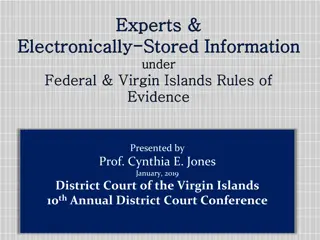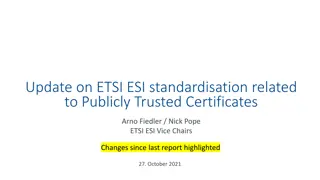
Tackling Undeclared Work in Greece Research Project
Explore the research project focusing on tackling undeclared work in Greece, covering aspects like corruption, tax evasion, and the shadow economy. The initiative aims to measure and analyze various economic issues in Greece, with a focus on tax compliance, corruption levels, and the impact of the shadow economy on GDP. The research involves examining the qualitative data gathered through economic experiments and surveys, with a goal of developing a deeper understanding of the challenges facing the Greek economy.
Download Presentation

Please find below an Image/Link to download the presentation.
The content on the website is provided AS IS for your information and personal use only. It may not be sold, licensed, or shared on other websites without obtaining consent from the author. If you encounter any issues during the download, it is possible that the publisher has removed the file from their server.
You are allowed to download the files provided on this website for personal or commercial use, subject to the condition that they are used lawfully. All files are the property of their respective owners.
The content on the website is provided AS IS for your information and personal use only. It may not be sold, licensed, or shared on other websites without obtaining consent from the author.
E N D
Presentation Transcript
TACKLING UNDECLARED WORK IN GREECE A. Anagnostopoulos, A. Bitzenis, P. Kontakos University of Macedonia, Thessaloniki, Greece Wednesday, July 8, 11:00-13:15, Session [13] Room: Santa Eulalia II, Grande Real Santa Eul lia Resort 27thB&ESI Conference 2015 Albufeira / Algarve, Portugal, July 6-9, 2015
Note: The current paper is presented under the auspices of the THALES Research Programme. THALES Programme has been co- financed by the European Union (European Social Fund - ESF) and Greek national funds through the Operational Program Education and Lifelong Learning of the National Strategic Reference Framework (NSRF). 2
Foreword to our Project Our aim is to research and measure all various aspects of shadow economy in Greece, including corruption, tax evasion, tax avoidance, social contribution avoidance, undeclared and illegal work, self-consumption, tax morale level, tax compliance level, illegal and criminal acts (black or underground economy, money- laundering, human and drug trafficking, briberies). It covers all economic agents in Greece, such as citizens and corporations (e.g. public servants and private individuals, companies and all professional categories, etc.) The research is also performed at sector levels, e.g. to identify the extent of tax evasion and corruption in the trading of oil in Greece. 3
Foreword to our Project (cont.) It measurement of Greek shadow economy but aims to the qualitative analysis of questionnaire results and the comprehension of the problem. does not aim to the precise percentage regarding the The implementation of our economic experiments (tax compliance games) involves at least 2,000 individuals and business owners (in majority small businesses). interviews, scientific games and The project aspires to achieve numerous objectives, among which the development of a relevant theoretical background, and perform cross-country comparisons at regional level, but also with country groups with advanced taxation systems. 4
Foreword to our Project (cont.) In Greece, during the period 2008-2014, both unemployment increased from 8% to 27% and the GDP per capita decreased almost 25%. THALES results show that in contrast to the reduction of the shadow economy as a percentage of GDP from 28% before the crisis at 24% in 2013, we estimate that at the end of our full research analysis, probably, this percentage will have exceeded 30% in 2014/2015. 5
Agenda 1. Aim of the paper 2. Introduction and definitions of undeclared work 3. Types of undeclared work 4. Measuring undeclared work 5. Reasons and motives of undeclared work 6. Restrictive policies on undeclared work 7. Conclusions 6
1. Aim of the paper Analyze the nature and types of informal employment as well as the role of labour market institutions on informal economic activities in Greece. Present the main factors influencing informal employment, labour and tax regulations. Propose strategies for combating undeclared work, to reset the country on a sustainable recovery path. 7
2. Introduction and definitions In this study, we will examine undeclared employment, otherwise known as hidden, black, undeclared, or informal employment. Williams (2004) mentions 35 adjectives and 5 nouns that can be used to describe it. Some peculiarities concerning the various approaches and corresponding naming in both international organizations & the literature. were encountered According to the European Commission (2007), the definition of undeclared work focuses on "any paid activities that are lawful as regards their nature but not declared to public authorities, taking into account differences in the regulatory system of Member States". Overall, is a complex and diverse matter influenced by a wide range of economic, social, institutional & cultural factors (EU, 2007 & OECD, 2008). 8
3. Types of undeclared work Informal employment has been classified according to its various characteristics by different organizations over time. It can be defined in terms of the employment type, the type of economy (labour market) or by grouping specific individuals together. According to the EC (EC, 1998) four groups of undeclared workers can be identified: (a) those who have two or more jobs, (b) those from the inactive population (c) the unemployed and (d) illegal immigrants. Given the aforementioned classifications by the various bodies (ILO and OECD), we propose the separation of the undeclared work in Greece according to the labour market (Scheme 1). 9
3. Types of undeclared work (cont.) Undeclared work Formal Labour Market Informal Labour Market Illegal Labour Market Secondary or Multiple Jobs Holders Wholly off-the-books Self- Employed (with undeclared employees) Pensioners Wholly off-the-books Own- Account workers Illegal Immigrants Wholly Waged Undeclared Work Unpaid Family Workers Unpaid Family Workers Unemployed Workers Under-Declared Workers Household Production Undeclared Overtime Pay Extended part-time Hidden Subsidies received 10 Source: The Authors
3. Types of undeclared work (cont.) The formal labour market, consisting of formal enterprises which provide fully or partly informal activities to its salary workers. - Secondary or Multiple employment: a person is employed by more than one employer during the same time period. Workers with social security coverage in their main job may see little benefit in contributing in their second job (OECD, 2008). - Wholly waged undeclared work: This refers to work provided by a legitimate business which is entirely hidden from the state for taxation, social insurance and labor law purposes. According to Schneider (2011) the percentage of "workers" without a contract in Greece is the third highest among European countries at 39%. - members offer their free services to a registered family-owned business without being declared as workers with the official authorities Per the Greek Statistical Services (ELSTAT), unpaid family 11
3. Types of undeclared work (cont.) - Per the Greek Statistical Services (ELSTAT), unpaid family members offer their free services to a registered family-owned business without being declared as workers with the official authorities. - Under-declared employment: This refers to employees who simultaneously receive two salaries: (a) a legitimate salary from declared and insured work, and (b) an additional remuneration received "under the table" or by "envelope". The employer does not pay contributions while the employee, who already has insurance coverage, does not increase his taxable income. Detection" of this form of undeclared employment by the official authorities is extremely difficult (OECD, 2004). 12
3. Types of undeclared work The shadow labour market, consists of unregistered firms and any form of work (either own account workers or wage workers), not registered with the authorities; The illegal labour market involves categories of citizens who do not have the legal right to work. 13
4. Measuring undeclared work There employment: (a) indirect (e.g. discrepancy methods, monetary methods, etc.), through secondary macroeconomic data and (b) direct, through primary (questionnaire) data, which are quite limited in volume (e.g. as the Census, the Labour Force Survey LFS and Eurobarometer). are of measuring undeclared two main methods In Greece, the LFS, which is conducted by ELSTAT, provides reliable and widely accepted assessment. However, only one of the questions in the questionnaire (Kanellopoulos, 2012). refers to uninsured work Other sources of data collection are bodies (authorities), such as Social Security Organisation (IKA), the Labour Inspectorate (SEPE) and the Public Employment Agency (OAED) which monitor, control and track employment in Greece. 14
4. Measuring undeclared work (cont.) Quantitative estimates of the extent and structure of undeclared employment did not exist in the case of Greece (Karantinos, 2007), until recently. One Kanellopoulos who applied the indirect method. He compared the registered number of salaried employees insured by IKA, with the number of salaried employees who had declared that they were insured with IKA as shown by the Labour Force Survey (LFS) which is carried out on a quarterly basis. of the few efforts attempted in 2012 was made by As he characteristically points out: "the LFS number exceeding the IKA number, in relation to the corresponding number given by the IKA itself can be regarded as reflecting the number of undeclared IKA employees." 15
5. Reasons & motives of undeclared work Why businesses either individually or in conjunction with their employees wish to take part in the informal economy? The answer to this question is that, internationally, undeclared employment aims to avoid the taxation of labour and social security legislation. Lazaridis (2003) believes that one of the most significant labour market characteristics in Greece is the fact that a large proportion of it operates within the informal economy. The large number of small family-run businesses and the tertiarization of the economy & employment have created the conditions for flexible and cheap labour. This effect combined with the impact of the crisis has resulted in an increase of the share of part-time employment in Greece (Table 2). 16
5. Reasons & motives of undeclared work (cont.) Table 2: Changes on Full-Time and Part-Time Employment (2008-2014) Change 2008-2014 (%) Employment Type 2008 2009 2010 2011 2012 2013 2014 TOTAL 4.567,2 4.545,6 4.446,0 4.165,5 3.785,0 3.504,2 3.483,7 -24 Full-time 4.299,7 4.263,1 4.156,8 3.877,7 3.508,2 3.196,3 3.163,5 -26 Part-time 267,5 282,4 289,2 287,8 276,8 307,9 320,2 20 Part-time (%) Source: Greek Statistical Services & Institute of Employment, LFS 2008-2014 Term 6,2 6,2 6,5 6,9 7,3 8,8 9,2 17
5. Reasons & motives of undeclared work (cont.) Labour-intensive enterprises in a competitive global market can survive by reducing labour costs. Thus, to meet their needs, they choose to "recruit" members of their family and when this is not possible, migrants, to completely or partially avoid wage and non- wage costs. As noted by Tatsios (2001), in the case of Greece, it is clear that the factors internationally recognized as fostering and reinforcing the phenomenon of undeclared work, not only exist, but are structural features of the Greek economy and employment. Other reasons are related with the financial condition of a country or region and the total cost of labour (tax rates, employer contributions, minimum wages) and legal and administrative burdens; also, the share of small businesses and the percentage of self-employed (Table 4). 18
5. Reasons & motives of undeclared work (cont.) Table 4: Percentage (%) of Self-employed in Greece & selected EU-28 countries GEO/TIME European Union (28 countries) Belgium Bulgaria Czech Republic Denmark Germany (until 1990 former territory of the FRG) Ireland Greece Spain France Croatia Italy Cyprus Latvia Lithuania Luxembourg Hungary Malta Netherlands Austria Poland Portugal Romania Slovakia Finland Sweden United Kingdom Turkey Source: Eurostat (2014): Percentage of self-employed by sex, age groups and household composition 2005 14.9 13.1 12.0 15.2 2010 14.6 13.1 11.8 16.8 7.1 10.4 15.4 29.7 16.0 10.7 18.0 22.7 15.3 9.9 9.1 7.1 11.8 13.8 14.2 11.3 18.8 17.5 19.5 15.8 12.3 9.4 13.3 24.3 2011 14.5 12.9 10.8 17.5 8.5 10.4 15.0 30.4 15.6 10.7 17.6 22.5 14.8 10.1 9.0 7.8 11.4 13.2 14.3 11.4 18.8 16.6 17.9 15.8 12.5 9.1 13.5 23.4 2012 14.6 13.1 10.5 16.8 8.4 10.5 14.8 31.4 16.3 10.6 16.3 22.4 13.7 10.3 9.6 8.0 10.9 13.0 14.7 11.1 18.5 16.8 18.2 15.4 12.6 8.8 13.9 22.7 2013 14.5 13.8 10.7 17.1 8.9 10.1 15.5 32.0 16.9 10.3 15.7 22.3 14.9 10.5 10.5 8.0 10.4 13.3 15.5 11.1 18.2 16.9 18.0 15.5 12.5 9.0 14.0 22.1 : 10.8 : 29.3 16.3 9.8 20.0 24.0 19.7 9.0 13.9 7.7 13.1 13.6 11.8 11.7 20.0 20.0 19.0 12.6 11.7 : 12.3 : 19
6. Restrictive policies on undeclared work Since the beginning of the sovereign debt crisis in 2009, Greece undertook to reform its labour market relations based on the Memorandums of Economic and Financial Policies by IMF-EC- ECB. The governmental policies during the last 6-y have intended to: (a) promote an institutional and legal framework rendering more labour flexibility, and (b) tighten the rules and introduce a system of penalties for labour law infringements. One of the main reforms that Greek government has introduced is the reduction of gross national minimum wages by 22% (from 751 to 586 monthly rate). Moreover, has lowered the minimum wages for young people (below 25-y) by 32% ( 510 monthly rate). 20
6. Restrictive policies on undeclared work (cont.) Regarding labour flexibility, it reduces the length of dismissal notice period (especially to those employees with long tenure) and lowers severance payments for white collar workers. It also redefines collective dismissals increasing the threshold for firms with more than 20 employees. With regard to temporary employment and fix-term contracts, it has introduced a longer probationary period (from 2 months to 1 year). It has also extended the maximum cumulated duration of fix-term contracts to 36 months (previously 24 months). The employer has the right in case of a slowdown in activity - to introduce short-time working arrangements on a daily, weekly or other basis, for a period up to 9 months. 21
6. Restrictive policies on undeclared work (cont.) Focusing on inspection mechanisms to combat undeclared work, the state has reformed the structure of the Labour Inspectorate and allows inspections-visits to firms controlled jointly by the Labour Inspectorate (SEPE), the Social Security Organisation (IKA) & the Financial and Economic Crime Unit (SDOE). The Ministry of Labour recently (March 2013) launched a new information system called Ergani. All employers - after a trial period are obliged by law to submit online forms required by labour market management organisations (SEPE, IKA, OAED). Following that, the state has succeeded procedures & administrative burdens for employers, issues which as discussed above push firms to the informal labour market. in reducing bureaucratic 22
7. Conclusions In this research we have studied many aspects of undeclared work and emphasized the Greek labour framework. The two main characteristics of the Greek economy (a) the large number of micro enterprises and (b) the high rate of self- employment play an extremely important role in our issue. During the crisis, a shift from full-time workers to flexible employment (mainly to part-time) employment has taken place. or probably to informal It seems that the measures that have been taken are in the right direction. The next steps should be geared towards the development of businesses; this is the only way businesses can survive and grow, by creating new jobs and shifting back many "flexible" and "grey" jobs to full time status. 23






















